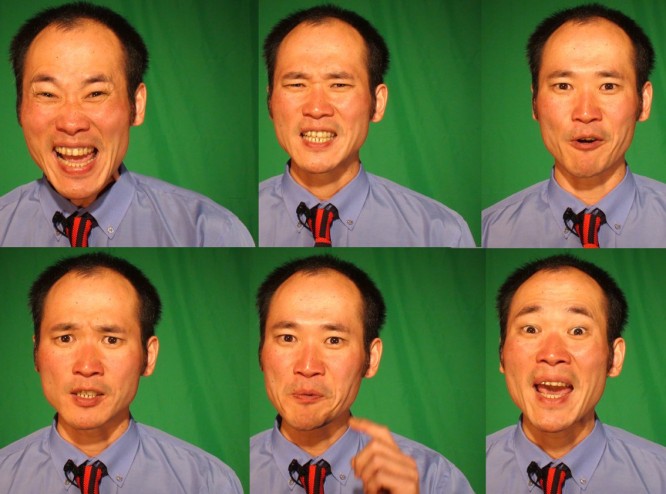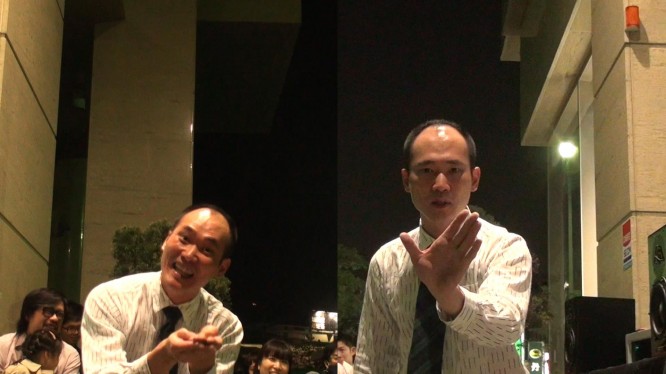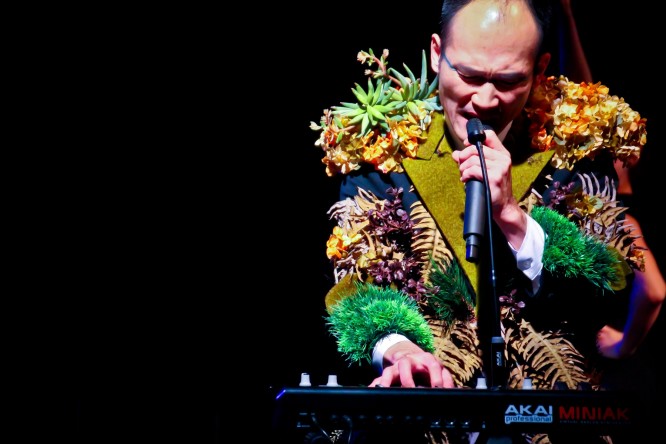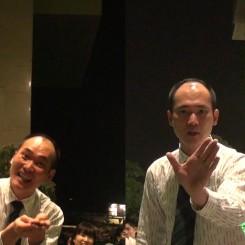“Cycling through the years, Hsiao-Ying has always been the mainstream’s satirical shadow.”
—David Frazier (1)
In Taiwan, Ying Wei-Min (應蔚民, a.k.a. Hsiao Ying (小應)) has been a popular figure since he founded the Clippers Band (夾子) in 1995. Starting from noise experimentation, the band, led by Ying (other band members changed over time) has gone through phases of transformation, creating music of diverse genres including pop , techno, jazz and lounge.One of the band’s distinctive features is its integration of elements from local musical traditions such as nakashi (那卡西 (2)), and local pop songs of the past. Through such an idiosyncratic hybrid of the local and the global, pop and underground, the vocalist, composer and songwriter Ying sings lyrics that are vulgar, funny and touching, yet full of social critique.
The band’s most popular song “Turn on the Disco Ball” remains one of the hottest tunes in local karaoke bars, creating an unprecedented phenomenon for an indie band. Representative of the poppy side of Ying’s music, the song’s straightforward lyrics express emotions common to all — or, more precisely, to ordinary people under pressure of work, society and life in general. In concert, such catchy lines and fluent melodies are acted out in a kitsch style, accompanied by a variety of show elements and dancers on stage, reinforcing the spectacular and often exaggerated nature of the Clippers’ performance. As a whole, their performance also implies a certain kitsch culture seen in some local people’s clothing styles or visual details in daily life, vividly incarnated through Ying’s outfit in the MV of Turn on the Disco Ball (3).

Ying Wei-Min, “The Very DVD Set: The Frenziness of a Salesman”, DVD, 2001 (courtesy Ying Wei-Min)
《这套 DVD(推销员之狂)》(2011),应蔚民提供
However, beneath this lighthearted surface, a keen audience might sense a pensiveness about human existence, along with a vulgar vitality pertaining to pop culture or the lower classes. While shifting between experimental and pop music styles, Ying continues to elaborate lyrics that convey more complex ideas. Notably, he sometimes sings or recites in a way that imitates “cross talk” (相聲) where he, alone, plays the two roles. Through the lyrics, Ying explores and excavates the hypocrisy inherent in modern society, and repressed feelings under a collective system of values — particularly in the context of Taiwan. The enterprise is carried out through abundant references to local history and culture, as well as Ying’s witty, jumping, ridiculous and irrational yet thought-provoking expressions.
Parallel to his career as a musician and a performer, Ying is also an actor for theater, films and TV series. His strong performance orientation has led him into the field of video art and performance. In 2011, he presented the video work “The Very DVD Set: The Frenziness of a Salesman” (這套 DVD (推銷員之狂))(2011) in the group show “Live Ammo” (活彈藥) at the Museum of Contemporary Art (MOCA) in Taipei. With the title referring to Arthur Miller’s play Death of a Salesman (1949), Ying plays the role of a TV shopping channel host selling a DVD set called “The Very DVD Set” which, in fact, does not exist. The DVD set contains examples of improper laughing that would harm one’s career; in his alternative role-play, Ying also acts as a high-school student whose episode reflects the uniform force imposed by education.
On the whole, Ying brings forth the fluent persuasion of a salesman whose speech implies work-place conventions and games as well as conflicting sentiments within the human psyche. Through copious and laborious litanies, “The Very DVD Set” penetrates to the core of the emptiness of consumerism and, essentially, of the promise of a bright future which we are taught to hold onto from school days into adulthood. (4)
Having been a salaryman for almost three years, quitting before founding his band, and having served in a psychiatric hospital in his army days where he reflected on the idea of ‘madness’ and how all kinds of madness manifest themselves also in “ordinary people”, only to lesser degrees, Ying’s solo artistic career thus revolves around themes like the struggle between the ordinary (as approved by certain systems of values) and the insane, and psychological distortion under certain societal contexts.
These themes are seen extended in Ying’s latest video-performance, “Momentary Fantasia of a White Collar” (上班族一時的狂想)(2013), where he plays a contemporary salaryman who fabricates a story to escape the boredom of work. The story is set in Taiwan in the 1950s, when the country sought development through petrochemical industries. It features a young couple whose conversation represents the mainstream values of the time. The sequences jump between the past, the present and recordings of the Clippers Band’s concerts while Ying himself plays every role. Schizoid connotations are furthered by the arbitrary arrangement of settings — for example, the story of the 1950s might be acted out in a modern-day parking lot near the salaryman’s office.
Throughout Hsiao-Ying’s career, from indie musician to video artist and multimedia performer, his multi-faceted oeuvre represents a persistent existentialist study by means of satire. Themes of alienation or other forms of psychological repression recur, culminating in his first self-produced theatre piece Show of Happy Solitude (快樂孤獨秀)(2012). Written by Hsiao-Ying and featuring himself and three experimental theatre actors as well as Japanese artist Asako Otsuka (who also did the visual design), the play delivers individual confessions about his/her own solitude alongside a live analysis of the psychology of laughing. As Guo Liang-Ting points out in his article (5), the play is characterized by its paradoxical and ambiguous nature: the jokes both prompt and hold back the audience’s laughter; Hsiao-Ying’s lines—which are both flippant and reasonable—can seem sincere and artificial at the same time. Such a subtle performance points precisely at the core of the unspeakable experience of solitude as it is revealed throughout the show—an experience which one undergoes also through the experience of art. Finally, the oxymorons and ironies carried by the entire play (including its title) imply a nihilism which finds its “happy” and animated counterpart in Hsiao-Ying’s song “Turn on the Disco Ball”:
“Turn! Turn On! The colorful disco ball! Let me see through this life.
Let the questions without answers
all drop into the puddles after the rain! (rhymed)
Turn! Turn On! People who sweat! Forget our sorrow and agony,
Follow the singing that penetrates the brain, proving that this life is still colorful!”
—”Turn on the Disco Ball”

Ying Wei-Min, live performance before the Art Issue Project in Taipei accompanying the showcase of “Momentary Fantasia of a White Collar”, 2013 (courtesy Ying Wei-Min)
台北艺术计划前伴随《上班族一时的狂想》(2013)的现场表演,应蔚民提供

Ying Wei-Min, “Show of Happy Solitude”, theatre performance( photo -Tang Jien-Je, courtesy Ying Wei-Min
剧场作品《快乐孤独秀》(2012),唐健哲摄影,应蔚民提供
Notes
1. Originally published on Pots Extra, no. 358 (after the publication resumed), May 6-15, 2005 (Taiwan).
2. A musical style, ‘the nasal, Japanese organ music that’s like the country and western of Taiwan’s past.’ See David Frazier, ibid.
3. Watch the MV at http://www.youtube.com/watch?v=TXtxiKaaVBU
4. During the show in MOCA Taipei, Ying also made five live shows where he performed the entire content of “that DVD” in an uninterrupted way. Watch MOCA performance and artist’s interview at http://www.youtube.com/watch?v=pCHVT5wn4ak (Chinese speaking)
5. Original Chinese version published in Performance Art Review (《表演藝術》), n. 238, Oct. 5th, 2012 (Taiwan).



